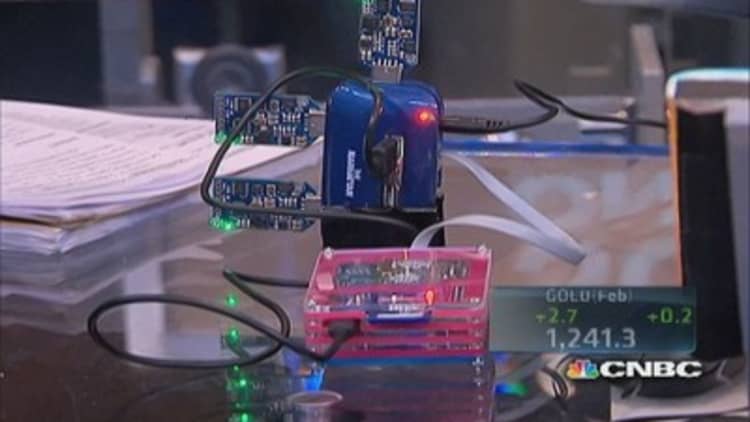
Over the holidays, I spent many hours reading up on bitcoin, and I was struck by just how large the ecosystem and variety of players was. Putting aside the debate around bitcoin's value, I think there is no debate that this is an intriguing and very very interesting space.
As an investor, I'm bullish but cautious, as a hobbyist I can't stop reading about it.
(By way of disclosure, I own a very small number of bitcoins. Also I'll tell you about a bunch of services I've played with but I can't vouch for them beyond a cursory examination. There are certainly fraud and theft concerns in the bitcoin universe so caveat emptor.)
A few aspects of the ecosystem that I'm currently studying for the pleasure of it are: hobby mining rigs, mining pools, software, and professional mining hardware and shares.
Hobby rigs
You need tremendous computing power "to mine" bitcoins in an efficient manner. This is because it takes a lot of time and electricity for a computer to perform the calculations to crack the math problems that result in new bitcoins. However as a hobbyist, you can turn just about any computer into a "mining rig."
(Read more: Bitcoin breaks $1,000 after Zynga opts in)
My friend Kane Hsieh came over this week and built this rig with me. (And my "with me," I mean he was kind enough to install everything while I asked questions.)
Here's what it looked like:
We used a $25 dollar RaspBerry Pi computer running Linux and those USB keys with the bitcoin logo are Icarus processors. They are specialized processors for mining bitcoins. Amazon lists a version of these too.
For what it's worth, Kane says that setting up a small mining rig is a great way to get some hands-on learning about bitcoin but warns that small rigs are almost never profitable.
(Read more: 'Coinye West': Yep, it's a Kanye West bitcoin-like currency)
Mining pools
Because we have such a small computer, we joined a "mining consortium." This allows us to combine our small bits of work mining coins with a network of many others.
Here is our mining rig just starting to work after connecting to the consortium; we chose Eclipse:
Software
There are countless programs that can be used to mine coins. We chose cgminer, which is very popular, but with names like Bitminter, Easyminer, and BTCMiner there are lots of choices.
(Read more: Don't rule out a ban on virtual currencies)
There are also plenty of places to buy, sell, trade and hold your bitcoins. Mt.Gox is the one of the largest exchanges and Coinbase is one of the easiest and most mainstream, recently closing financing rounds from Union Square Ventures and Andreesen Horowitz.
Going pro
The professional end of the spectrum includes massive server farms with specialized hardware that are mining to make real money. These tend to be in cold places because the hardware runs so hot. You can actually buy "mining shares" in some of these companies that allow you to access a portion of the coins they mine. I don't know the credibility of these operations and have not met anyone who has bought a share.
At the lower end of pro, you can buy hardware from a company like Butterfly Labs, which Kane has used from a learning perspective and says works.
(Read more: Here's what should bolster bitcoin in 2014)
Again, bitcoins over time get progressively harder to mine and the electricity costs of mining can approach or surpass the coins that you mine. So I'm uncertain if mining can be profitably done at this point.
Conclusion
You can see there is a lot here. It strikes me that this is an investable market from the hobbyist, education, and entertainment angles, beyond the investment and exchange angles. I'd be curious to know the number of hobbyist in the space but judging from the volume of message boards it must be significant.
The interest in bitcoin is such that a some innovative hacker even figured out a way to create an app that lets you load the bitcoin price and chart onto your Pebble watch. I couldn't resist and loaded it up myself:
The risks in the bitcoin market are clear and we see new ones each day, such as the FBI holding $130 million in bitcoin that it could dump. However, on the other side, we see major financial institutions making bets on it as well, such as news that Fortress might be starting a bitcoin fund.
(Read more: Bitcoin endorsed by top hedge-fund manager)
The intellectual excitement and great many bitcoin hobbyists sit outside this two-sided coin. Now if bitcoin completely fails, the hobbyists will no doubt flee. But I think it's worth noting that hobbyists can be an important driver in something new like they were with personal computers, and it feels like bitcoin certainly has that.
—By Jon Steinberg
Jon Steinberg is the president & chief operating officer of BuzzFeed and is responsible for all business management, company operations, finance, and social advertising operations. Follow him on Twitter @jonsteinberg.

